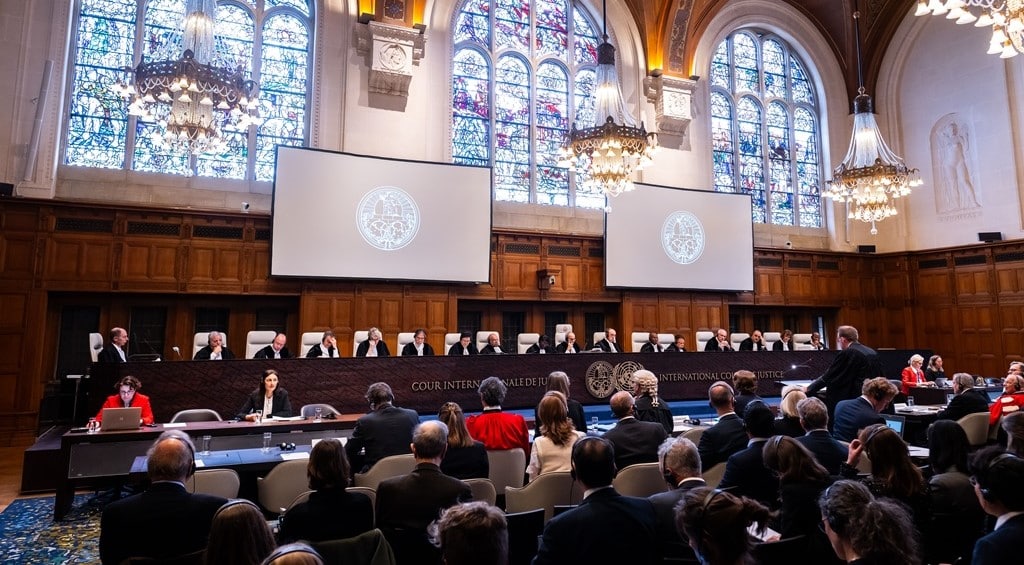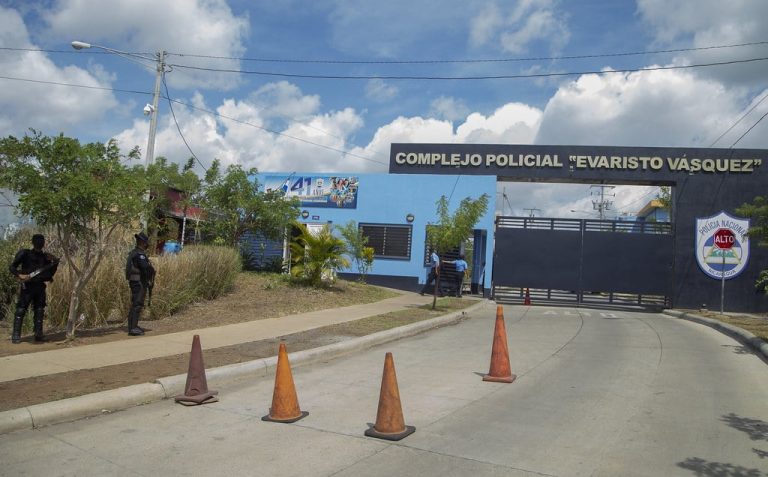3 de octubre 2021

ICJ Rules Against Nicaragua's Request For Germany to Halt Arms Sales to Israel

PUBLICIDAD 1M
PUBLICIDAD 4D
PUBLICIDAD 5D
Sick, blocked from leaving the country, and filled with anguish, the political prisoners’ loved once confront a harsh reality in silence

Prisoners in El Chipote report that a typical meal might consist of 40 individual beans
The day that political prisoner Ana Margarita Vijil saw her mother after 80 days of imprisonment in the police complex known as the “New Chipote” jail, she wanted to be strong. Still, her mother noticed that Ana Margarita was pale, very thin and was suffering from a stomach infection, but her greatest concern was her mother’s health, as she has been in treatment for cancer since 2019.
Despite all the difficulties she faces in jail, Ana Margarita didn’t want to distress her mother. “Instead of telling me things about herself, she asked about me,” says Maria Josefina, affectionately known as Pinita. “I’ve had chemotherapy twice. I’ve lost my hair, and now it’s grown back. I’m in the process of a cure, but cancer is hard; it’s treacherous and you never know. In addition, it can grow stronger during these moments of tension and pain that the unjust detention of Ana Margarita and Tamara has caused us.” Tamara Davila, her granddaughter, is also a political prisoner.
Cristian Tinoco, daughter of political prisoner Victor Hugo Tinoco, is also battling cancer. She’s currently in the hospital, and her illness represents her father’s greatest worry. In addition to these cases, there’s the situation of political prisoner Max Jerez. His mother passed away from pleural effusion and pneumonia on September 17, but Max, her son, was not allowed to say goodbye to her.
The Nicaraguan Human Rights Center (Cenidh) has counted at least eight cases of political prisoners whose family members died without their being able to see them. Meanwhile, last week, the Social Movements Coordinating Group disclosed a list of 15 political prisoners who have lost close family members since 2018.
The cruel, degrading and inhumane treatment suffered by the political prisoners under the regime of Daniel Ortega and Rosario Murillo is shared by their families. Vilma Nuñez, Cenidh president, affirms that the families are “practically being victimized” as well, since in some cases they’re not even allowed to visit a loved one on their deathbeds. In other cases, relatives suffering serious illness are mistreated in the different state institutions.
The victimization of the political prisoners’ relatives represents “an extremely grave situation”, Nuñez advises. She cites the principles of criminal justice, which state that “the punishment shouldn’t extend beyond the prisoner’s individual self”. If someone is found guilty of any crime, “that anguish, that desperation, shouldn’t be transferred onto their families; they have the right to see them regularly, and in the case of a death, the prisoner should have the possibility of attending the funeral service.”
“It’s truly painful, truly dramatic to see the permanent pilgrimages of those families, climbing that hill to approach the “New Chipote” jail with the hope of finding some police officer who will offer a different response than the one they’re ordered to give. The most they’ve managed is: ‘We’ll ask’, or ‘They’re orders from above’. Where is above? The response – ‘They’re orders from above’ – tells the world that the orders for all the imprisonments and all the violations of rights are coming right from El Carmen (the presidential residence).” Nuñez observes.
On September 2, Pinita Gurdian was on a bus for Costa Rica, to undergo specialized exams that could rule out the presence of cancer cells in her body. However, at the Peñas Blancas border office, Nicaraguan authorities took away her passport and essentially forced her to return to Managua. Since that time, she’s asked on several occasions about getting her document back. No one has been able to explain why she’s blocked from leaving the country.
The Police Complex known as the “New Chipote” jail. Photo: Confidencial
“I was stopped at Peñas Blancas, and I couldn’t continue my trip because they took my passport away. That passport hasn’t been returned. It’s a totally arbitrary action. Why are they detaining me? I was traveling for my health. Why would they detain me, if I’m a free person? I have a right to leave, I have a right to move freely,” complains Pinita. She’s trying to be strong, because, “this situation harms the process of my cancer fight. I know that remaining calm is the best present I can give them (Ana Margarita and Tamara).”
Prevented from traveling outside the country for her specialized exams, “the only thing I’ve done is to see my gynecological oncologist here. But that won’t help discover if I have cancer cells in my body,” Pinita comments. She’s very fearful that the disease could continue developing in her body.
Lesther Aleman Navarrete, father of political prisoner Lesther Aleman Alfaro, encountered an equally arbitrary travel restriction. He flew to Nicaragua from the United States, to investigate his son’s situation and to support his wife in Nicaragua. Inexplicably an “order from above” kept him from entering his own country.
Alemán told Confidencial that when he first got off the plane, he noticed the presence of two policemen and two Nicaraguan Army officials. He didn’t react, but continued down the airport corridor. He presented his negative COVID test, and his immigration paperwork, then proceeded to the counter to have his passport stamped. At that moment, he realized the four officials were behind him. Yet another police official then approached him, together with an employee of Nicaragua’s Office of Migration and Foreign Affairs, who asked for his passport.
After examining his passport, they asked him to remove his mask to take his picture. They led him into a separate room where a police official asked him: “Did you know you don’t have permission to enter the country?” Lesther Sr. asked why, since he’s Nicaraguan and was entering on a national passport. The official responded: “There’s an order from above that you can’t enter.”
The isolation regime imposed on the political prisoners doesn’t allow their relatives to communicate, or inform them of situations in the family. That’s been the case with political prisoner Miguel Mora, whose relatives have been unable to inform him that his wife, Veronica Chavez, and his son Miguelito, who has a disability, were hospitalized in critical condition with COVID-19.
Political prisoner Miguel Mora with his son Miguelito, prior to the journalist’s detention. Courtesy photo
Fabiola Chavez, Veronica’s sister, lamented: “we haven’t had an opportunity to let (Miguel) know” about his wife and son’s illness. His lawyer introduced a brief to have him informed, but we’re “unaware” if that occurred.
The political prisoner’s son has been in intensive care since September 15. Due to his neurological problems, COVID impacted him severely, and his lungs are very affected. Meanwhile, Veronica is out of the hospital and recovering.
In 2019, when Miguel Mora was imprisoned for six months for the first time, his maternal grandmother, Clorinda Barbarena, died. He wasn’t allowed to attend the funeral.
Family members of the political prisoners imprisoned in the context of the current electoral process, state that neither the Courts nor the Police have offered them any explanation of the complete isolation imposed on their loved ones. They’ve sent out an urgent call, highlighting “the imminent risk of irreversible harm to the physical and psychological integrity of our family members.”
Vilma Nuñez, Cenidh president, points out that the Nicaraguan government is violating the United Nation’s “Nelson Mandela Rules” (Standard minimum rules for the treatment of prisoners). Among other things, these rules stipulate informing prisoners “at once of the serious illness or death of a near relative or any significant other. Whenever circumstances allow, the prisoner should be authorized to go (…) to the bedside of a near relative or significant other who is critically ill, or to attend the funeral of a near relative or significant other.”
Knowing that their loved ones are in a difficult situation is hard enough for the relatives of the political prisoners. However, the fact that they can’t see them or find out anything that’s happening to them is “anguishing”. No rights at all have been respected in these cases. The hearings have been held in jail, and the lawyers are able to do very little.
“The pain is suffocating me. I feel like I can’t breathe, because it’s terrible to feel that someone you love – in my case, two people – are in that situation: locked up, alone, incommunicado, hungry,” states Pinita Gurdian. “It envelops my emotions, my heart, my hours. I can’t sleep at night; I can’t eat, because it’s not easy going more than 104 days with only one short visit,” she states.
In her moments of desperation, “I turn to my Christian faith and to my family,” Pinita comments. She assures that all therapies are “useless” when family members are in prison, held in worse condition than the common criminals. “They’re innocent of all the charges they want to heap on them,” she reiterates. “I demand freedom for them and for all those who are political prisoners. Freedom, freedom, freedom!” Pinita Gurdian concludes.
This article was orginally published in Spanish in Confidencial and translated by Havana Times
Archivado como:
PUBLICIDAD 3M
Confidencial es un diario digital nicaragüense, de formato multimedia, fundado por Carlos F. Chamorro en junio de 1996. Inició como un semanario impreso y hoy es un medio de referencia regional con información, análisis, entrevistas, perfiles, reportajes e investigaciones sobre Nicaragua, informando desde el exilio por la persecución política de la dictadura de Daniel Ortega y Rosario Murillo.
PUBLICIDAD 3D